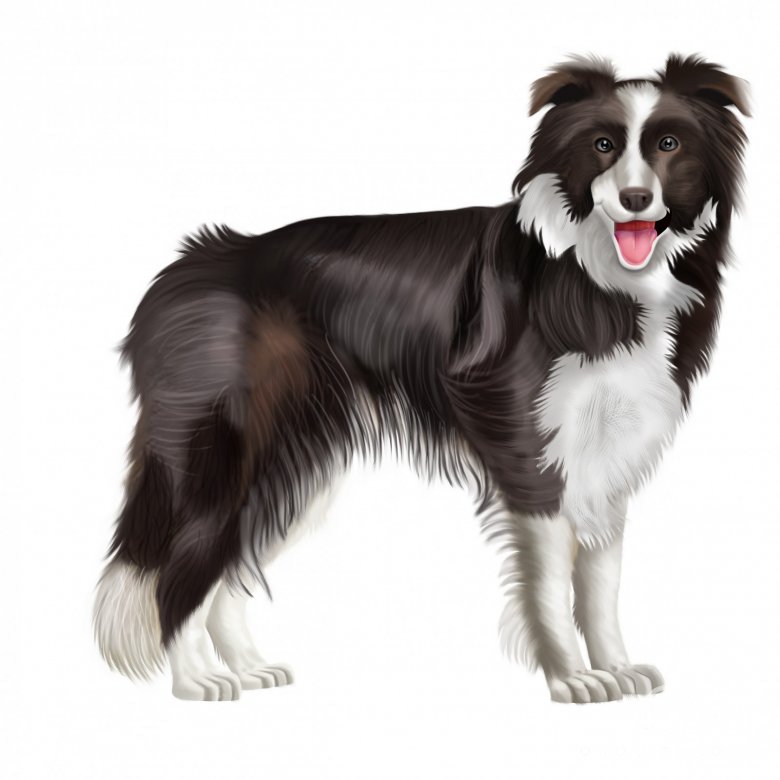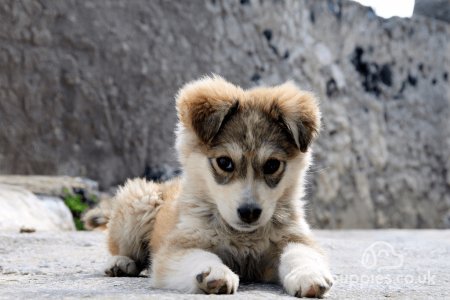Welsh Collie (Welsh Sheepdog)
Overview
The Welsh Collie has been used to herd sheep in remote regions of Wales for centuries. These intelligent working dogs are highly prized thanks to their temperament and impressive sheep herding methods. The Welsh Collie is a loyal, affectionate dog that is full of energy. As this breed is very active anyone considering a Welsh Collie should know they require a lot of time from their owners. Welsh Collies are popular family dogs and are natural watchdogs. The Welsh Collie is medium in size and looks similar to Border Collies, although Border Collies are taller and heavier.
Physical Appearance
The Welsh Collie is a medium-sized dog that is well-balanced, alert and always ready to work. The breed can vary in appearance as their coats can be long and wavy or short and smooth depending on the individual. The Welsh Collie has a broad head with a tapering muzzle, their noses are black, brown or slate in colour and have well-developed nostrils. The alert and intelligent eyes of a Welsh Collie are usually brown but one or both eyes can be blue in Blue/ Red merle collies.
The medium ears of a Welsh Collie are erect or semi-erect and set well apart. Welsh Collies have an athletic body with a strong neck, deep chest and well-developed leg muscles. Welsh Collies have oval-shaped feet with deep pads, arched toes and short nails. The long, low set tail helps to keep the Welsh Collie looking balanced and well proportioned.
The feathered double coat of a Welsh Collie can be red, brindle, black, tricolour, red merle or blue merle in colour. White is never the predominant colour of a Welsh Collie. The coat of a Welsh Collie can be long or short, either way, they will have a soft undercoat and dense topcoat to protect them against the elements.
How big do Welsh Collie dogs get?
Character Traits
Welsh Collies are working dogs that are happiest when they have a job to do. The breed is intelligent and high energy, Welsh Collies need owners that can put a lot of time and energy into them. The affectionate, loyal nature of the Welsh Collie has made them a popular choice as family dogs but they are better suited to active families that live in a rural environment. Welsh Collies are fast learners, they are very easy to train and enjoy learning new things. If a Welsh Collie is brought into a domestic environment rather than a working one then it is a good idea to introduce them to dog sports and herding events where they often excel and enjoy competing.
Are Welsh Collie dogs intelligent? Yes.
Are Welsh Collie dogs affectionate? Yes.
Do Welsh Collie dogs have high or low energy levels? High energy levels (5/5).
Are Welsh Collie dogs loyal? Yes.
Are Welsh Collie dogs playful? Yes.
Are Welsh Collie dogs aggressive? No.
Are Welsh Collie dogs easy to train? Yes (5/5).
Are Welsh Collie dogs good guard dogs? Yes, they are natural guard dogs.
Ability to Socialise
Welsh Collies bond strongly with their family and can get on well with children. As this breed has a strong need to work, this instinct to protect and herd can mean they try to round up young children which is why they are better suited to families with older kids. When around other dogs, Welsh Collies tend to be reserved but will get on well with dogs they are familiar with. The breed can get along with other pets such as cats if they have grown up around each other, they may try to herd smaller animals so take care when introducing a Welsh Collie to other animals. This breed is not aggressive at all but tends to be wary of strangers, this is one of the traits that makes the Welsh Collie a good watchdog.
Do Welsh Collie dogs get along with other pets? Yes, they are good with animals they have grown up around.
Do Welsh Collie dogs get along with other dogs? Yes, although they may be reserved at first.
Are Welsh Collie dogs good with kids? They are better with older children as they may try to herd younger children.
Are Welsh Collie dogs good with strangers? They are wary of new people.
Lifestyle Suitability
Although the Welsh Collie is a loving, loyal dog they need experienced owners who know how to handle and train them. The Welsh Collie is an active, intelligent dog that is better suited to a working farm and is not a good breed for living in an apartment. A Welsh Collie is happiest in a rural environment where the noise levels are low and they have plenty of space to exercise. The breed needs an active owner who has plenty of time to put into training and exercising. Welsh Collies can tolerate being left alone for short periods but they shouldn’t be left for extended periods of time.
Are Welsh Collie dogs good for first-time owners? No, they need an experienced owner who knows how to handle and train them.
Are Welsh Collie dogs hypoallergenic? No.
Are Welsh Collie dogs prone to drooling? No.
Are Welsh Collie dogs a good breed for apartment living? No.
Do Welsh Collie dogs shed a lot? They shed moderately.
Do Welsh Collie dogs bark a lot? Yes.
Can Welsh Collie dogs be left alone at home? Yes, for short periods.
Can Welsh Collie dogs handle the heat? Yes.
Can Welsh Collie dogs handle cold temperatures? Yes.
Are Welsh Collie dogs sensitive to loud noises? Yes, they can be.
General Health & Health Issues
Welsh Collies have an average life expectancy of 12 - 15 years. They are known for being healthy and hardy but there is limited information on hereditary health issues as not many puppies have been registered. The health concerns associated with Welsh Collies include:
Fading puppy syndrome - this is when a puppy is apparently normal at birth but fades and dies within the first 2 weeks. This can happen for a number of reasons as newborn puppies are susceptible to a variety of illnesses and issues. The progression of fading puppy syndrome is quick and it is often too late to save the puppy.
Cancers - cancer is mostly seen in older Welsh Collies. There are many different cancers that can affect dogs, symptoms can include a lump, low energy, reduced appetite, weight loss, vomiting, coughing and increased thirst. A vet can run tests to diagnose the cancer and will be able to recommend treatment based on this.
Cataracts - cataracts are mostly seen in older Welsh Collies. Cataracts can develop in old age, theye develop slowly and cause a gradual loss of vision. Symptoms can include cloudiness in the eye, loss of vision and pain. Cataracts can be treated with surgery or can be left alone.
How long do Welsh Collie dogs live? 12 - 15 years
Exercise & Play Time
Welsh Collies have a lot of energy and need at least 2 hours of exercise a day. As a Welsh Collie is best suited in a working environment they can be active most of the day without tiring. The breed needs mental stimulation as well as exercise so they benefit from having a job to do or participating in dog sports and herding events. Welsh Collies need lots of space and long, interesting walks. This is not a dog that enjoys city parks or walks around the block, Welsh Collies need lots of quiet, open space. They can be walked without a lead as long as there is no livestock around for them to herd.
How much exercise does a Welsh Collie dog need? At least 2 hours per day.
Do Welsh Collie dogs like water play? Yes, particularly on hot days.
Nutrition & Feeding
Welsh Collies do not have any breed-specific dietary requirements. As a healthy breed, they do well on most high-quality dog food. A Welsh Collie puppy needs between 150 - 365g of high-quality dry food each day, this needs to be split into 3-4 smaller portions and should be offered throughout the day. The actual amount will depend on the puppy’s age and build. This is just an estimate, it is important to have a personal dietary plan made as every dog is unique.
Are Welsh Collie dogs prone to weight gain? No.
How much should I feed a Welsh Collie puppy? Between 150 - 365g of high-quality dry food a day depending on age and build.
How much should I feed an adult Welsh Collie dog? Between 175 - 280g of high-quality dry food a day depending on weight and activity.
Care & Maintenance
Grooming: A long-haired Welsh Collie needs to be brushed every couple of days to prevent tangles while a short-haired Welsh Collie needs a weekly brush to keep their coat tidy. It is important to keep a Welsh Collie’s flea treatment up to date as they are often allergic to fleas. This breed sheds moderately year round but this does increase in Spring and Autumn where more regular grooming is needed. The Collies ears should be checked and cleaned regularly to prevent ear infections.
Emotional Care: A Welsh Collie needs a lot of physical and mental stimulation, without this they can become depressed and frustrated causing them to become destructive and exhibit unwanted behaviours. The Welsh Collie is a working dog with a strong need to work, this is why they always need to be busy or have a job to do. Training these Collies is easy, they are intelligent and respond well to training sessions as long as they are kept interesting.
History of the Welsh Collie
The exact origins of the Welsh Collie are unknown but it is believed they are the result of working collies from England and Scotland being crossed with native Welsh breeds during the 19th century. There are records mentioning these herding dogs from 800 years ago where they would’ve been used for protecting and herding flocks just as today’s Welsh Collies are. The number of Welsh Collies declined during the late 1800s/ early 1900s as they were crossed with a large number of other collie types.
As there are such limited records available for the Welsh Collie breed, the way a true Welsh Collie would be judged was on the way they herded. A Welsh Collie will not fix their eyes on a flock like a Border Collie does, instead they will have a “loose eye” on the flock, this is a highly observant technique that allows the Welsh Collie to work alone.
The Welsh Collie is not a recognised breed by The Kennel Club but The Welsh Sheepdog Society was formed in 1997. There are very few Welsh Sheepdog Society registered puppies each year. The breed is popular in the UK as a companion and a working dog.
Interesting Facts About Welsh Collie Dogs
This breed has been used to protect and herd flocks for centuries.
Welsh Collies are a popular working dog breed in the UK.
The character Rooster in The Secret Life of Pets 2 is a Welsh Collie.
The Welsh Collie is not a recognised breed by The Kennel Club.
Welsh Collies use a different herding method to Border Collies.
Getting a Welsh Collie Puppy
If you are ready to bring a puppy home, take a look at our buying guide for information and advice on finding and buying a puppy. As puppies are expensive it is important to be aware of scams and never pay a deposit before seeing the puppy. All of the breeders on Puppies have been vetted to ensure they are responsible. Take a look at our Welsh Collie Puppy Page to find available dogs in your area.
How much does a Welsh Collie cost to buy? £600 - £1000
How much does a Welsh Collie cost to feed? £50 per month.
How much does insurance for a Welsh Collie cost? £35 per month.
An alternative option is to rescue a Welsh Collie. We recommend speaking to your local dog rescue centre or contacting the associations below about rehoming a Welsh Collie:
Rehome a Welsh Collie with the Dogs Trust
Talk to Wiccaweys about rehoming a Welsh Collie











